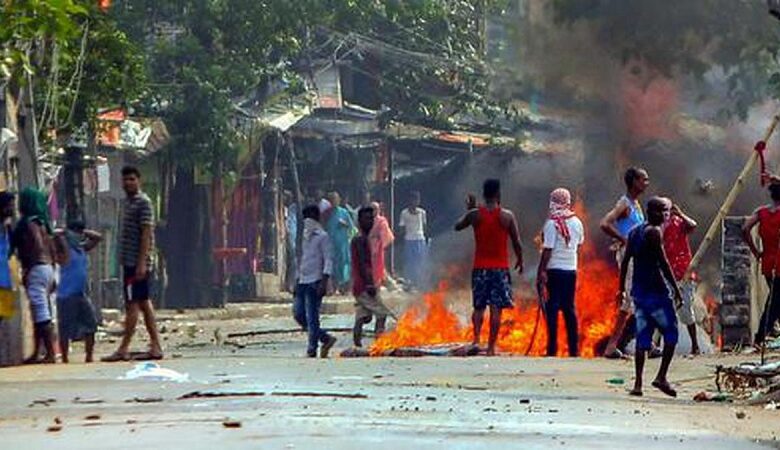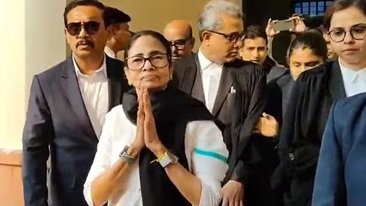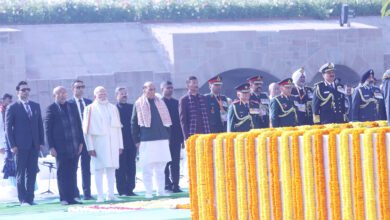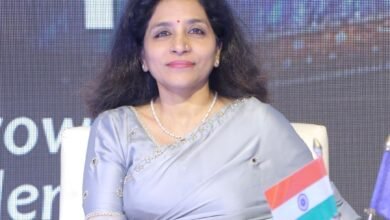Violence Erupts During Final Phase of Lok Sabha Polls in West Bengal

News Mania Desk/Agnibeena Ghosh/1st June 2024
Clashes and Allegations Mar Seventh Phase of Elections
Violence marred the seventh and final phase of the Lok Sabha elections in West Bengal, affecting nine parliamentary constituencies. Reports of clashes emerged from the violence-prone Jadavpur and Diamond Harbour constituencies, where workers from the Trinamool Congress (TMC), Indian Secular Front (ISF), and Bharatiya Janata Party (BJP) clashed. Despite the Election Commission’s claims of a peaceful voting process, it received 1,899 complaints by 1 PM, citing issues like malfunctioning Electronic Voting Machines (EVMs) and polling agents being obstructed from entering booths.
Accusations of Proxy Voting
In Kolkata North, TMC supporters accused BJP candidate Tapas Roy of conducting proxy voting, leading to heated confrontations outside polling stations. Roy dismissed the allegations, asserting that the presence of polling agents would have prevented any proxy voting attempts. “I don’t know about proxy votes; their polling agents are present there (at the polling booth),” he said, denying any wrongdoing.
Violence in Bhangar and Kultuli
Bhangar, a part of the Jadavpur constituency, witnessed violent confrontations between TMC and ISF supporters, with accusations of crude bombs being thrown by both sides. The police intervened, dispersing the crowd with a lathi charge and recovering several crude bombs. Both factions blamed each other for the violence, leading to heightened tensions.
In Kultuli, within the Joynagar constituency, frustrated voters threw EVMs and Voter Verified Paper Audit Trail (VV-PAT) machines into nearby water bodies. Their actions stemmed from suspicions of electoral misconduct and dissatisfaction with the perceived restrictions on voting.
Extensive Preparations for Final Phase
The Election Commission of India had meticulously prepared for the seventh phase of the Lok Sabha polls, scheduled for June 1, 2024. This phase included 57 parliamentary constituencies across eight states and Union Territories, alongside elections for 42 assembly constituencies in Odisha. The extensive preparations marked the culmination of the world’s largest polling marathon, which began on April 19 and covered six phases and 486 Lok Sabha seats.
Polling parties were dispatched with all necessary equipment and materials to ensure a smooth voting process. Polling stations were equipped with essential facilities such as shade, drinking water, ramps, and toilets to create a comfortable environment for voters. Despite the hot weather, voter turnout in previous phases had been impressive, with female voter turnout surpassing that of males in the last two phases.
Ensuring Security and Fairness
To ensure the integrity of the elections, the Election Commission deployed 10.9 lakh polling officials to manage over 1.09 lakh polling stations. The voter base for this phase included approximately 5.24 crore male, 4.82 crore female, and 3,574 third-gender electors. Special provisions were made for elderly and disabled voters, including an optional home voting facility for those over 85 and PwD electors.
Logistical support included 13 special trains and eight helicopter sorties to transport polling and security personnel, particularly in remote areas like Himachal Pradesh. Additionally, 172 observers, including general, police, and expenditure observers, were on the ground to ensure vigilant monitoring. Special observers were also deployed in certain states to oversee the process.
Vigilance and Surveillance
A robust surveillance system was in place, featuring 2,707 flying squads, 2,799 static surveillance teams, 1,080 surveillance teams, and 560 video viewing teams. These units operated round-the-clock to promptly address any attempts to influence voters through illicit means. Furthermore, 201 international border check posts and 906 inter-state border check posts maintained strict vigilance to prevent the smuggling of liquor, drugs, cash, and other incentives. Security measures also extended to sea and air routes to curb any illegal activities.
Facilitating Voter Participation
Efforts were made to facilitate voter participation, with voter information slips distributed to all registered voters. These slips served as a convenience measure and an invitation to vote, although they were not mandatory for voting. Voters could verify their polling station details and polling dates through an online portal provided by the Election Commission. Additionally, 12 alternative identification documents were accepted for voting, ensuring that all registered voters could cast their ballots.
Conclusion
Despite the challenges and incidents of violence, the final phase of the Lok Sabha elections proceeded with extensive preparations and security measures. The Election Commission’s efforts to ensure a smooth and fair voting process underscored the significance of democratic participation in the world’s largest democracy. As the country awaits the counting of votes on June 4, the focus remains on maintaining peace and upholding the integrity of the electoral process.






